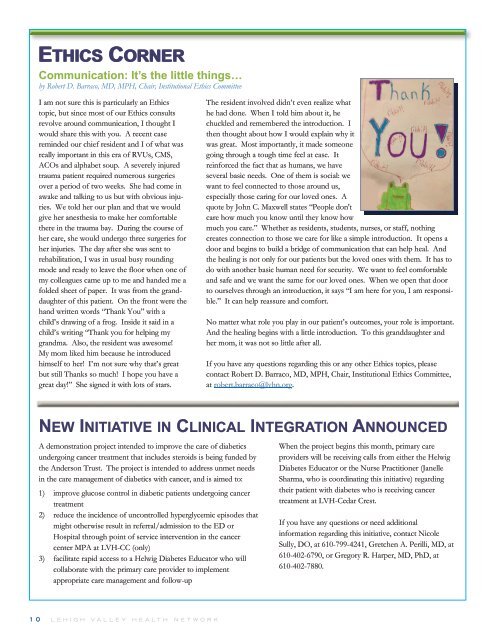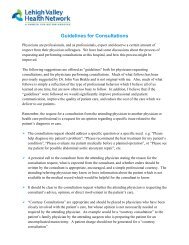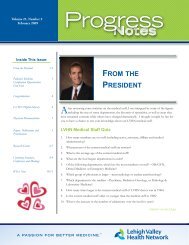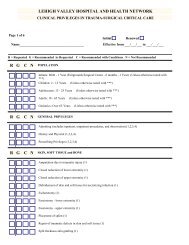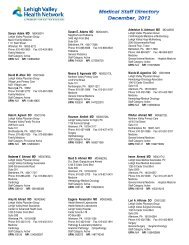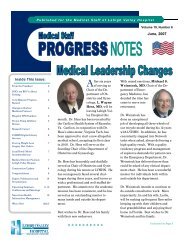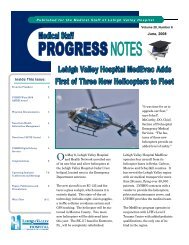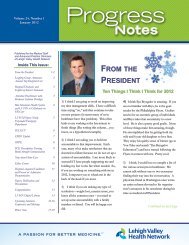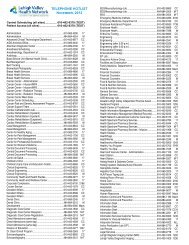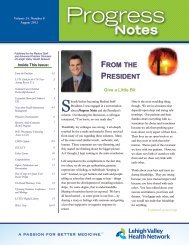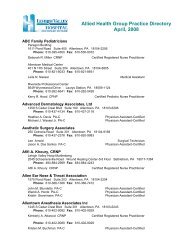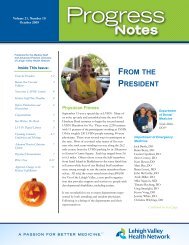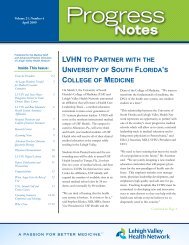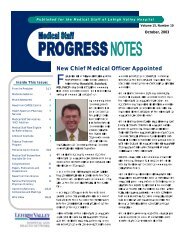September - Medical Staff Services - Lehigh Valley Health Network
September - Medical Staff Services - Lehigh Valley Health Network
September - Medical Staff Services - Lehigh Valley Health Network
You also want an ePaper? Increase the reach of your titles
YUMPU automatically turns print PDFs into web optimized ePapers that Google loves.
ETHICS CORNER<br />
Communication: It’s the little things…<br />
by Robert D. Barraco, MD, MPH, Chair, Institutional Ethics Committee<br />
I am not sure this is particularly an Ethics<br />
topic, but since most of our Ethics consults<br />
revolve around communication, I thought I<br />
would share this with you. A recent case<br />
reminded our chief resident and I of what was<br />
really important in this era of RVUs, CMS,<br />
ACOs and alphabet soup. A severely injured<br />
trauma patient required numerous surgeries<br />
over a period of two weeks. She had come in<br />
awake and talking to us but with obvious injuries.<br />
We told her our plan and that we would<br />
give her anesthesia to make her comfortable<br />
there in the trauma bay. During the course of<br />
her care, she would undergo three surgeries for<br />
her injuries. The day after she was sent to<br />
rehabilitation, I was in usual busy rounding<br />
mode and ready to leave the floor when one of<br />
my colleagues came up to me and handed me a<br />
folded sheet of paper. It was from the granddaughter<br />
of this patient. On the front were the<br />
hand written words “Thank You” with a<br />
child’s drawing of a frog. Inside it said in a<br />
child’s writing “Thank you for helping my<br />
grandma. Also, the resident was awesome!<br />
My mom liked him because he introduced<br />
himself to her! I’m not sure why that’s great<br />
but still Thanks so much! I hope you have a<br />
great day!” She signed it with lots of stars.<br />
The resident involved didn’t even realize what<br />
he had done. When I told him about it, he<br />
chuckled and remembered the introduction. I<br />
then thought about how I would explain why it<br />
was great. Most importantly, it made someone<br />
going through a tough time feel at ease. It<br />
reinforced the fact that as humans, we have<br />
several basic needs. One of them is social: we<br />
want to feel connected to those around us,<br />
especially those caring for our loved ones. A<br />
quote by John C. Maxwell states “People don't<br />
care how much you know until they know how<br />
much you care.” Whether as residents, students, nurses, or staff, nothing<br />
creates connection to those we care for like a simple introduction. It opens a<br />
door and begins to build a bridge of communication that can help heal. And<br />
the healing is not only for our patients but the loved ones with them. It has to<br />
do with another basic human need for security. We want to feel comfortable<br />
and safe and we want the same for our loved ones. When we open that door<br />
to ourselves through an introduction, it says “I am here for you, I am responsible.”<br />
It can help reassure and comfort.<br />
No matter what role you play in our patient’s outcomes, your role is important.<br />
And the healing begins with a little introduction. To this granddaughter and<br />
her mom, it was not so little after all.<br />
If you have any questions regarding this or any other Ethics topics, please<br />
contact Robert D. Barraco, MD, MPH, Chair, Institutional Ethics Committee,<br />
at robert.barraco@lvhn.org.<br />
NEW INITIATIVE IN CLINICAL INTEGRATION ANNOUNCED<br />
A demonstration project intended to improve the care of diabetics<br />
undergoing cancer treatment that includes steroids is being funded by<br />
the Anderson Trust. The project is intended to address unmet needs<br />
in the care management of diabetics with cancer, and is aimed to:<br />
1) improve glucose control in diabetic patients undergoing cancer<br />
treatment<br />
2) reduce the incidence of uncontrolled hyperglycemic episodes that<br />
might otherwise result in referral/admission to the ED or<br />
Hospital through point of service intervention in the cancer<br />
center MPA at LVH-CC (only)<br />
3) facilitate rapid access to a Helwig Diabetes Educator who will<br />
collaborate with the primary care provider to implement<br />
appropriate care management and follow-up<br />
When the project begins this month, primary care<br />
providers will be receiving calls from either the Helwig<br />
Diabetes Educator or the Nurse Practitioner (Janelle<br />
Sharma, who is coordinating this initiative) regarding<br />
their patient with diabetes who is receiving cancer<br />
treatment at LVH-Cedar Crest.<br />
If you have any questions or need additional<br />
information regarding this initiative, contact Nicole<br />
Sully, DO, at 610-799-4241, Gretchen A. Perilli, MD, at<br />
610-402-6790, or Gregory R. Harper, MD, PhD, at<br />
610-402-7880.<br />
10 LEHIGH VALLEY HEALTH NETWORK


